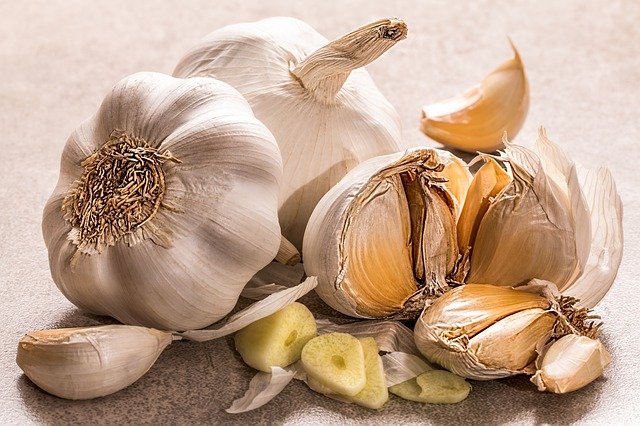
Garlic is one of the natural and accessible medicines that you can take advantage of. It contains allicin, a natural substance that helps alleviate blood pressure and inflammation.
However, this ability of garlic may be compromised when it is frozen. Many people asked me if allicin will be destroyed.
So, does freezing garlic destroy allicin?
Freezing garlic can destroy the allicin. If you plan on freezing a lot of garlic or only have fresh garlic then it is best to wait until after you cook it before putting it in the freezer.
If you remove the garlic after cooking and let it cool, then freeze it, there will still be some allicin present.
Putting fresh garlic in the freezer does more damage to its chemical properties than when cooked first. This is because frying causes some of the water and fat to evaporate while also increasing the internal temperature which accelerates any chemical reactions already underway.
Pre-cooked garlic does better in the freezer than freshly picked since most of its structure is gone by that point anyway.
What is allicin?
Allicin is a compound naturally found in garlic. It is created when garlic is cut or crushed (e.g., chopped) and gives the characteristic ‘garlicky’ smell.
Allicin has many uses, including as an antibiotic, anti-fungal, and antioxidant.
What does allicin do?
The most important thing to know about allicin is that it’s responsible for garlic’s pungent odor and flavor. Some people find this odor offensive – making it hard to integrate into recipes.
That said, if you can get past the smell of raw garlic you’ll be rewarded with numerous health benefits.
The biggest benefit to allicin is the high concentration of anti-oxidants in each molecule. These cause chemical reactions that neutralize unstable molecules, which prevent cell damage.
Allicin is also known to increase blood circulation and thin the bloodstream. The thinning of the blood prevents clots from forming – lowering the risk of heart disease and reducing pain when it enters an area with ongoing inflammation or infection.
The antibacterial effects of allicin have been studied in great detail, particularly for fighting off Staphylococcus Aureus (commonly found in wounds).
How can I preserve the flavor of my fresh garlic instead of freezing it?
The best way to preserve the flavor of garlic and make it easy to use is by dehydrating.
When you freeze or store fresh garlic in oil, some of the active ingredients are destroyed. The taste, smell, and texture take on an unappetizing quality when frozen for extended periods of time.
How do I make dehydrated garlic?
To make dehydrated garlic, simply slice the cloves of a head of garlic then place them on a mesh screen or rack.
Dehydrate at 145 degrees for 10-12 hours (this can also be done in an oven with the lowest setting). The time it takes to properly dry depends on how thick you cut your slices and whether you are using fresh or store-bought.
Once fully dried, remove from the heat source and cool at room temperature for about 1 hour.
After this period, grind them into powder by running through a grinder that’s been fitted with a medium-sized grinding blade.
Mix thoroughly to ensure all particles are broken up before storing them away in an air-tight container.
You can store the garlic powder indefinitely but to maintain its potency (and fresh taste) it should be kept in a cool, dark place.
How do I use dehydrated garlic?
You can add dehydrated garlic powder by itself or mixed with other spices to virtually any dish. The flavor won’t be degraded when added to something or simply served on top as a garnish.
You can also make garlic salt by mixing it with kosher salt then lightly toast it in a frying pan (just like you would do with fresh garlic).
This will create ‘garlic flavored’ flecks that add extra character to your recipes without having to add raw garlic.
Dehydrated garlic is also great for use in bread, soups, and sauces as they have a lower moisture content which helps reduce the clumping of powder particles.
How long is dehydrated garlic good for?
The shelf-life of dehydrated garlic powder depends on how it’s stored. To make the best powder, you want to keep it in an area that’s free from moisture and light.
This will prevent any mold or clumping from forming which can alter the flavor – making it taste harsh and bitter instead of fresh.
Because allicin is sensitive to heat and humidity, always store your garlic in a dark place where it’s not exposed to air currents or extremes of temperature.
If you layer the containers between paper towels then place them in an air-tight container this will further reduce their exposure to harmful elements (including oxygen).
If you maintain proper storage methods your garlic should last for at least one year. How long the powder lasts after that depends on how it’s stored and your climate.
How do I know if garlic is bad?
As long as you follow proper storage techniques, the most predominant sign that your garlic is ‘bad’ will be a change in taste. It won’t affect its potency or texture – just the flavor.
If your garlic starts to taste harsh and bitter, then it suggests that the garlic is bad. Throw it away.
How long is dehydrated garlic good after the expiration date?
It depends… how are they marked with an expiration date in the first place?
I don’t think any dried goods have official “expiration dates”, though some manufacturers will claim that their product’s quality might diminish over time (which could be considered an expiration date).
How long is dehydrated garlic good past the expiration date? I’d say at least a year.
How long does dried garlic last?
Contrary to popular belief, you don’t have to refrigerate your dried garlic.
The product has already been exposed to heat and air so it’s likely that any bacteria (which can spoil food) has been killed off.
The shelf life of garlic powder will depend mainly on how it’s stored and what conditions are present.
If your powder is stored in a place that’s free from moisture where there’s no light then you can expect its taste quality and potency to last for up to 5 years before noticeable changes with the aroma, color, or consistency take place.
Final Thoughts
Freezing can affect the allicin content of garlic. However, some studies suggest that allicin will not be totally destroyed when the garlic is frozen but it certainly reduces the amount of the substance.
If you do not want to freeze garlic, you can dehydrate it instead. Doing so retains the flavor and taste of garlic.
The best thing about dehydrating garlic is that it makes it more durable and can last for years if stored properly.

